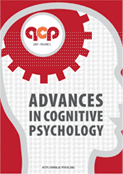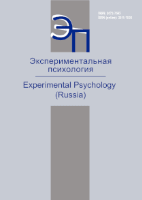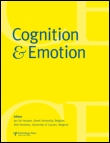
Advances in Cognitive Psychology
Scope & Guideline
Bridging Theory and Practice in Cognitive Science
Introduction
Aims and Scopes
- Cognitive Processes and Mechanisms:
The journal focuses on the underlying cognitive processes that drive human behavior, including attention, perception, memory, and decision-making. It seeks to explore how these processes are affected by various factors such as emotions, social dynamics, and environmental contexts. - Emotional and Affective Psychology:
Research examining emotional responses and affective states is a core area of the journal. This includes studies on empathy, emotional regulation, and the impact of emotions on cognitive functioning and decision-making. - Neuroscience and Psychophysiology:
The journal also integrates approaches from cognitive neuroscience, utilizing techniques like EEG and ERP to investigate the neural correlates of cognitive and emotional processes, thereby bridging psychology with biological perspectives. - Applied Cognitive Psychology:
Research with practical implications, such as cognitive rehabilitation, educational strategies, and workplace dynamics, is emphasized. The journal encourages studies that provide insights into improving cognitive health and well-being. - Interdisciplinary Approaches:
The journal promotes interdisciplinary research that combines cognitive psychology with fields like music psychology, social psychology, and educational psychology, reflecting the diverse applications of cognitive principles.
Trending and Emerging
- Integration of Emotion and Cognition:
There is a growing emphasis on understanding how emotional states influence cognitive processes. Recent studies explore the interplay between emotions, cognition, and behavior, highlighting the importance of affective factors in cognitive psychology. - Impact of Technology on Cognitive Processes:
Research examining the effects of digital environments, including social media and virtual realities, on cognitive and emotional functioning is increasingly prominent. This reflects a broader interest in how technology shapes human cognition. - Mindfulness and Cognitive Flexibility:
Studies focusing on mindfulness and its relationship to cognitive flexibility and emotional regulation are emerging. This trend indicates a growing interest in how mindfulness practices can enhance cognitive processes and well-being. - Cognitive Rehabilitation Strategies:
There is an increasing trend towards exploring innovative cognitive rehabilitation methods, particularly in populations such as stroke survivors. This reflects a commitment to applying cognitive psychology research to improve real-world outcomes. - Cross-Cultural and Contextual Studies:
Research examining cognitive and emotional processes across different cultural contexts is on the rise. This trend underscores the journal's commitment to understanding cognitive psychology within diverse frameworks and populations.
Declining or Waning
- Traditional Cognitive Models:
There appears to be a waning interest in strictly traditional cognitive models that do not incorporate emotional or social factors. Recent papers show a trend towards more integrative approaches that consider the influence of emotions and social contexts. - Static Assessments of Cognitive Function:
The focus on static measures of cognitive functions, such as IQ tests or fixed cognitive assessments, seems to be diminishing. There is a shift towards more dynamic and contextual assessments that account for variability in performance. - Basic Sensory Processing Studies:
Research centered solely on basic sensory processing without considering higher-order cognitive or emotional implications is less frequently published. The trend indicates a preference for studies that link sensory experiences to cognitive and affective outcomes.
Similar Journals

Journal of Cognitive Enhancement
Elevating Understanding in Behavioral and Experimental Psychology.Journal of Cognitive Enhancement, published by SpringerNature, is a premier academic platform dedicated to advancing knowledge in the fields of Cognitive Neuroscience, Behavioral Neuroscience, and Experimental Psychology. With an electric combination of rigorous research and innovative practice, this journal has established itself as an essential resource for researchers, professionals, and students interested in understanding the mechanisms behind cognitive enhancement and its implications for mental health and cognitive function. As of 2023, it is recognized in the Q2 and Q3 quartiles across several categories, demonstrating its solid impact in the academic community, particularly with an impressive Scopus ranking of #27/76 in Neuropsychology and Physiological Psychology. Operating in a competitive landscape, the Journal of Cognitive Enhancement fosters open dialogue and collaboration through valuable contributions to cognitive research, facilitating insights that are crucial for practical applications in clinical and educational settings. While specific open access options are currently not defined, we encourage all interested scholars to explore the rich database of published works dating from 2017 to 2024, contributing to this dynamic field of study.

MUSIC PERCEPTION
Exploring the Soundscape of Human ExperienceMUSIC PERCEPTION is a prestigious academic journal dedicated to the interdisciplinary exploration of musical experience and understanding. Published by the University of California Press, this journal has established itself as an essential resource in the field of music psychology, with a strong emphasis on how auditory stimuli influence human cognition and emotion. The journal boasts a commendable Q1 ranking in Music, placing it within the top-tier of scholarly publications, and it holds an impressive Scopus Rank of #4 out of 180 in the Arts and Humanities category, reflecting its critical role in advancing research within this domain. MUSIC PERCEPTION welcomes contributions that delve into diverse topics, including auditory perception, acoustics, and the psychological impacts of music, making it a vital platform for researchers, professionals, and students seeking to deepen their understanding of music's multifaceted nature. The journal is published annually and remains a cornerstone for academic discourse, ensuring that new findings are readily accessible to a global audience.

Review of Philosophy and Psychology
Illuminating the Connections Between Thought and BehaviorReview of Philosophy and Psychology, published by Springer, stands as a pivotal journal at the intersection of two influential disciplines. Operating under the ISSN 1878-5158, this esteemed publication has garnered attention since its inception in 2010, with a clear commitment to advancing the discourse in both Experimental and Cognitive Psychology and Philosophy. Notably, it has achieved impressive rankings in 2023, placing in the Q2 category for Experimental and Cognitive Psychology and Q1 category for Philosophy, further enhancing its credibility and appeal among scholars. With a notable Scopus ranking of #26 in Philosophy and #40 in Experimental Psychology, the Review of Philosophy and Psychology serves as an essential platform for the dissemination of research that equips readers with multifaceted insights and fosters interdisciplinary dialogue. While the journal maintains traditional access options, it continues to contribute significantly to its fields with high-quality articles that challenge and expand existing paradigms. As such, it is an invaluable resource for researchers, professionals, and students eager to explore and understand the nuanced relationships between philosophical inquiry and psychological research.

PSYCHONOMIC BULLETIN & REVIEW
Exploring the Depths of Cognitive and Experimental Psychology.PSYCHONOMIC BULLETIN & REVIEW is a premier journal published by SPRINGER, dedicated to advancing the fields of psychology, particularly within the domains of Arts and Humanities, Developmental and Educational Psychology, and Experimental and Cognitive Psychology. With its ISSN 1069-9384 and E-ISSN 1531-5320, the journal serves as a vital resource for researchers, professionals, and students striving to stay at the forefront of psychological science. The journal boasts an impressive impact factor and ranks in the top quartile (Q1) in relevant categories, reflecting its prestigious standing in the academic community. Covering research from 1994 to 2024, it offers rich interdisciplinary insights into psychological processes and theoretical developments, supporting researchers in disseminating their findings effectively. While not an open-access journal, it provides various access options to ensure that vital research remains within reach of its audience. With a commitment to fostering scholarly dialogue and innovation, PSYCHONOMIC BULLETIN & REVIEW plays an indispensable role in shaping contemporary psychological discourse.

Eksperimentalnaya Psikhologiya
Illuminating the pathways of cognitive exploration.Eksperimentalnaya Psikhologiya is a prominent open-access journal published by the Moscow State University of Psychology and Education, dedicated to advancing the field of psychology. Since its inception, the journal has offered a platform for the dissemination of innovative research in Experimental and Cognitive Psychology, as well as Neuropsychology and Physiological Psychology. The journal's commitment to open access, initiated in 2015, ensures that valuable research findings are freely available to scholars and practitioners worldwide. Although currently categorized in the Q4 quartile for 2023 within several psychology disciplines, it plays a vital role in promoting a diverse range of psychological studies and fostering interdisciplinary collaboration. With a focus on experimental methodology and cognitive processes, Eksperimentalnaya Psikhologiya provides a valuable resource for researchers, professionals, and students seeking to deepen their understanding of psychological science. The journal invites contributions from across the globe, particularly in the evolving landscapes of experimental techniques and neuropsychological research.

COGNITION & EMOTION
Unraveling the Complex Tapestry of Cognition and EmotionCOGNITION & EMOTION is a leading academic journal published by Routledge Journals, Taylor & Francis Ltd, focusing on the dynamic interactions between cognitive processes and emotional responses. Established in 1987, this esteemed journal has made significant contributions to the fields of Arts and Humanities, Developmental and Educational Psychology, and Experimental and Cognitive Psychology, consistently ranking in the top quartile (Q1) across various categories. Housed in the United Kingdom, COGNITION & EMOTION boasts a remarkable impact factor, underscoring its influence and importance in advancing psychological research and theory. While this journal does not offer open access, it remains a vital resource for scholars, professionals, and students seeking to deepen their understanding of emotional and cognitive phenomena. With a commitment to rigorous peer-reviewed research and innovative insights, COGNITION & EMOTION is essential for anyone aiming to stay at the forefront of psychological studies.

MEMORY & COGNITION
Revealing the Complexity of Human ThoughtMEMORY & COGNITION is a premier journal published by SPRINGER, dedicated to advancing the understanding of cognitive processes related to memory. Established in 1973, this esteemed journal covers a wide range of topics within the fields of experimental and cognitive psychology, neuropsychology, and physiological psychology, cementing its status as a leading voice in the arts and humanities. With an impressive impact factor and a consistent Q1 ranking across multiple categories, MEMORY & COGNITION attracts high-quality research that elucidates the intricacies of memory function and cognition. The journal is nestled within the competitive landscape of academic publishing in the United States and maintains robust accessibility options, inviting both quantitative and qualitative analyses from researchers, professionals, and students alike. By fostering interdisciplinary dialogue and collaboration, this journal plays a pivotal role in shaping the future of cognitive research, making it an invaluable resource for its readership.

Cognitive Processing
Bridging theory and application in cognitive processes.Cognitive Processing, published by SPRINGER HEIDELBERG in Germany, is a leading journal dedicated to advancing the understanding of cognitive processes through interdisciplinary research. With its ISSN 1612-4782 and E-ISSN 1612-4790, the journal covers a diverse range of fields including Artificial Intelligence, Cognitive Neuroscience, and Experimental and Cognitive Psychology, making it an invaluable resource for researchers and professionals alike. While it currently does not operate under an Open Access model, it is well-regarded within the academic community, holding a respectable impact factor and ranking in the Q2 and Q3 quartiles as of 2023. The journal aims to foster innovation and collaboration among scholars, presenting high-quality original research, reviews, and theoretical discussions that bridge the gap between cognitive science and its practical implications. With a convergence of research from 2005 to 2024, Cognitive Processing continues to play a critical role in the evolving landscape of cognitive science literature.

Neuropsychologia
Illuminating the Interplay of Brain and BehaviorNeuropsychologia, published by PERGAMON-ELSEVIER SCIENCE LTD, is a premier journal that delves into the intersections of psychology and neuroscience, specifically focusing on behavioral and cognitive processes. Since its inception in 1963, this esteemed journal has been a vital platform for researchers, professionals, and students, showcasing innovative studies and advancements in the fields of Behavioral Neuroscience, Cognitive Neuroscience, and Experimental Psychology. With a commendable impact factor, placing it in the Q2 category across multiple disciplines, Neuropsychologia is recognized for its contribution to the scientific community, ranking among the top journals in both Experimental and Cognitive Psychology and Neuroscience. The journal's commitment to excellence is evident in its rigorous peer-review process and its mission to disseminate cutting-edge research, making it an invaluable resource for those seeking to expand their knowledge and insights in neuropsychology. For further reading, the journal is accessible in both print and digital formats, ensuring that researchers can easily engage with the latest findings and theoretical advancements in this dynamic field.

PSYCHOLOGICAL RESEARCH-PSYCHOLOGISCHE FORSCHUNG
Advancing psychological science through interdisciplinary insights.Psychological Research – Psychologische Forschung is a renowned interdisciplinary journal published by Springer Heidelberg, operating from Germany. As a key publication in the field of psychology, particularly spanning areas such as experimental and cognitive psychology, developmental and educational psychology, and arts and humanities, this journal has made significant contributions to the advancement of psychological science since its inception in 1974. With an impressive impact reflected through its Q1 and Q2 categorizations across various fields, it occupies a prominent position in Scopus rankings, notably ranked #35 in Experimental and Cognitive Psychology. Researchers, professionals, and students alike benefit from its rich repository of original empirical studies, reviews, and methodological advancements. Whether you're seeking to contribute to your field or stay abreast of the latest developments, Psychological Research provides a crucial platform for disseminating innovative psychological knowledge. With a convergence of research years leading to 2024, the journal continues to evolve, maintaining its relevance and excellence within the academic community.